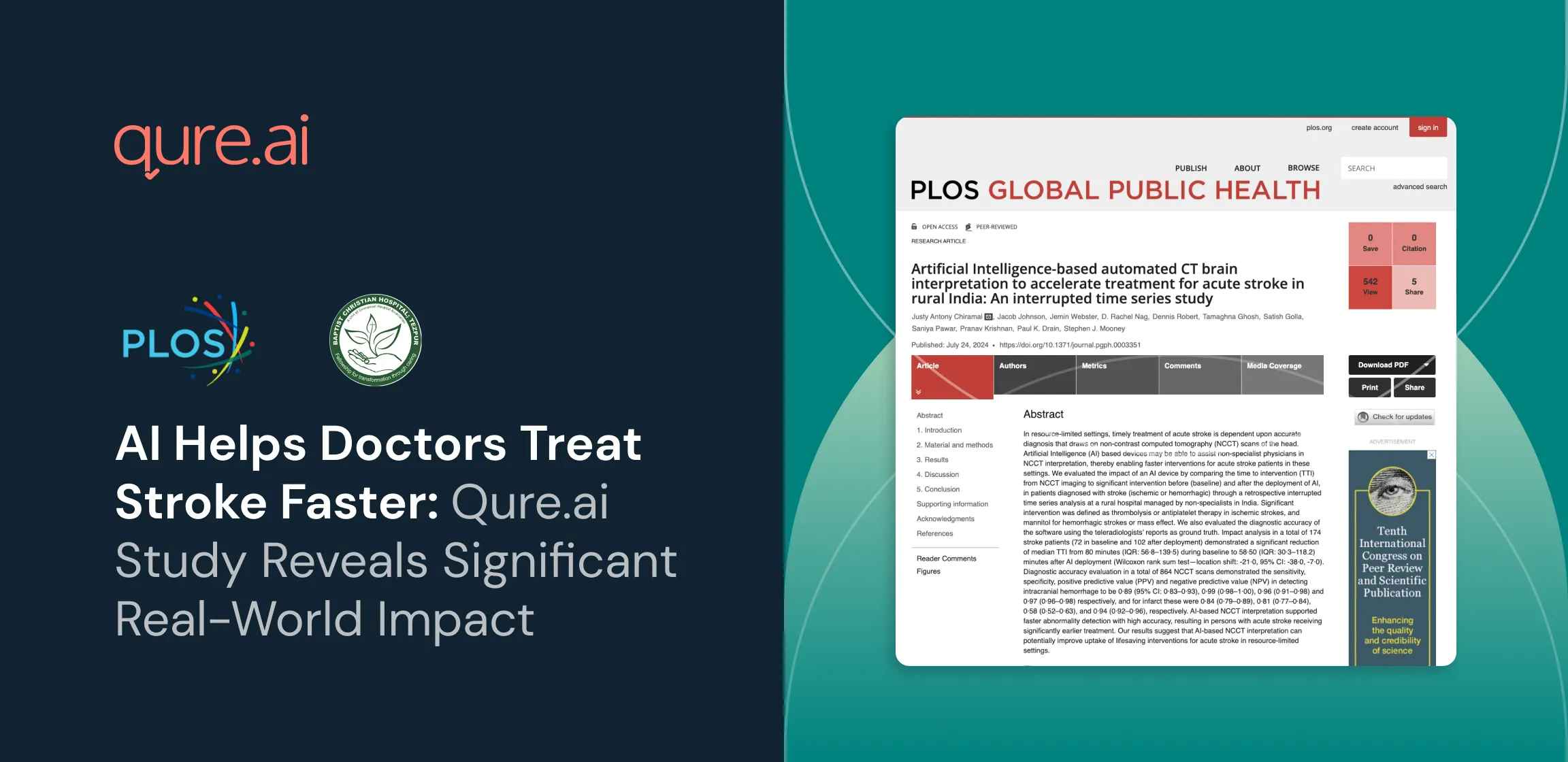Mumbai, India – 30th July, 2024 – Qure.ai, a global leader in healthcare AI, has recently demonstrated the significant potential impact of Artificial Intelligence (AI) on stroke care. In collaboration with Baptist Christian Hospital (BCH) in Tezpur, Assam, India, Qure.ai conducted a study focusing on the role of AI in improving stroke diagnosis and treatment times, especially in remote or resource-challenged settings.

Back
The study, titled "Artificial Intelligence-based Automated CT Brain Interpretation to Accelerate Treatment for Acute Stroke in India: An Interrupted Time Series Study," evaluated the effectiveness of Qure.ai's AI-powered stroke detection solution, qER.
Stroke is the second leading cause of death worldwide and a major cause of disability, emphasizing the need for timely intervention. In India, it ranks as the third leading cause of death and sixth in disability. The first 60 minutes post-stroke, known as the Golden Hour, are critical for intervention, as prompt medical treatment can significantly enhance recovery outcomes. The high economic burden of stroke-related hospitalization further underscores the importance of immediate medical attention.
BCH Tezpur is a 130-bedded charitable hospital under the Emmanuel Health Association. It has an ER with ten beds and provides both outpatient and inpatient services. BCH Tezpur does not have a neurologist in-house and depends on a tele-radiologist for the NCCT report analysis, which often takes hours. The nearest comprehensive stroke hospital is in Guwahati, 180 km away, making faster stroke diagnosis and intervention a challenge.
With only one neurologist per million people in India, often concentrated in urban areas, the Qure-BCH Tezpur study underscores the potential of AI-powered solutions to support clinicians in delivering superior patient care and transforming stroke management.
Qure.ai's solutions aim to enhance diagnostic accuracy and efficiency, ultimately improving patient outcomes through earlier detection. The qER solution analyzes head CT scans within minutes, highlighting critical findings and enabling physicians to quickly identify stroke patients and initiate treatment faster.
Key findings from the Qure-Tezpur study include:
- Increased Early Intervention: The proportion of patients receiving treatment within the first 30 minutes increased sixfold.
- Reduced Treatment Time by 27%: This significant reduction in treatment time has the potential to save lives by speeding up interventions for stroke patients.
- High Diagnostic Accuracy: The AI achieved 97% accuracy in ruling out bleeds in suspected stroke cases.
"Like BCH Tezpur, there are many hospitals across the world, particularly in LMICs, that are the first line of care for stroke patients. Given the challenges of accessibility to alternate superspecialty care centers, the treatment adequacy and timeliness in these centers decides the patient outcomes, and possibly post stroke quality of life for patients. It is heartwarming to see the real-world impact of our AI solution for stroke care at BCH, and we aim to see a similar transformation worldwide.” said Anumeha Srivastava, Chief Business Officer - Neurology of Qure.ai.
Dr. Jacob Johnson, Medical Director at Baptist Christian Hospital, remarked, "Integrating Qure.ai's AI-powered stroke detection solution has transformed our approach to stroke care. The ability to quickly and accurately diagnose strokes has allowed us to provide timely interventions, drastically improving patient outcomes in our hospital."
The findings from the Qure – BCH Tezpur collaboration indicate that AI solutions and technological advancements are helping to reshape the stroke care landscape. Qure.ai's stroke solution, qER, alongside the Qure App for streamlined care coordination, is enhancing access to neurocritical care in several Indian hospitals. Wider adoption of this AI-driven approach is the future of stroke care – it can facilitate faster interventions, potentially setting a new standard for treatment and significantly improve patient outcomes globally.